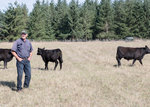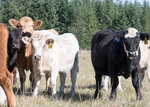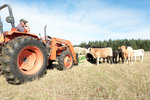


In the modern age of huge commercial farms and mass-produced food, Mark and Luanne Steelhammer’s family-run beef and Christmas tree farms are becoming a rarity.
But there’s a benefit to staying small, they said.
“There’s not many agricultural industries that you can go and cut an individual agricultural product and it goes into one family home,” said Mark Steelhammer, speaking in particular about the family’s tree enterprise.
However, the statement also applies to Steelhammer Family Farms, a newer project in which they raise grass-fed beef, sold almost exclusively to individual families.
“I think it’s very fulfilling for me,” Mark said. “I enjoy what I do. It’s not the money.”
Fall is a busy time on the farm. This week, the Steelhammers harvested part of their herd of Angus, Charolais, Simmental and Hereford-mix cattle. In about a month, they’ll start cutting down trees for the Christmas crop.
{{tncms-inline content="<p class="p1"><strong>About the Business: Steelhammer Family Farms, LLC</strong></p> <p class="p2">&bull; Owned by Mark and Luanne Steelhammer</p> <p class="p2">&bull; Located in Rochester</p> <p class="p2">&bull; 360-273-7216 or 360-280-3633</p> <p class="p2">&bull; steelhammerfamilyfarms@gmail.com</p>" id="c2708f4e-9272-4572-94b4-7433e1e8a902" style-type="info" title="About the Business: Steelhammer Family Farms, LLC" type="relcontent"}}
The Steelhammers got into the Christmas tree farm business in 1979 before branching out into home rentals and a storage facility in Rochester.
Luanne Steelhammer said her husband had family with a tree farm and thought it sounded like a good business opportunity.
Today, they have 300 acres of trees.
“I thought it’d be easy money, which it wasn’t,” Mark said. “It’s real labor-intensive.”
While a year-round job, the Christmas tree season kicks off in early November. The Steelhammers’ son takes trees down to San Francisco to sell at lots each year, but the rest are shipped all over the country, as far as Florida.
The Steelhammers’ son and daughter are both involved in the family business. While Mark spends much of his time in the fields, Luanne concentrates on running the financial side of the operation.
They grow noble, grand, Fraser, Nordmann and Douglas fir, but the noble and Nordmann varieties are becoming the most popular, they said.
They expanded again to include hay production and grass-fed beef cattle in 2005 and now maintain a herd of about 80 mother cows and their offspring spread out between fields on another roughly 200 acres of land in the Rochester area.
“I grew up on a dairy farm and I like cattle,” said Mark, who participated in 4-H and FFA as a kid. “I always liked the cattle but I didn’t want to milk them every night and morning.”
The Steelhammers decided to have grass-fed cattle, thinking that it’s a more sustainable and natural way to raise the animals.
“Cattle were never meant to eat grain,” Mark said. “They’re a foraging animal.”
However, most commercially raised cattle are now fed corn and other grains.
Luanne Steelhammer noted that grass-fed beef is considered by many to be healthier than grain-fed beef.
“There’s definitely a difference in taste,” she said.
The Steelhammers’ cattle spend about a year longer on their farm before being “harvested” than their grain-fed counterparts, meaning they spend two or three years in their fields.
They also occasionally sell “feeder” cattle, 7-to-9-month-old calves, to larger farms where they will be fed grain before being slaughtered.
Beef from the Rochester farm isn’t available in stores — they sell quarter, half or whole animals to individual buyers. After the animal is slaughtered, it goes to a custom butcher who cuts the meat to the buyer’s individual specifications.
“They can get what they like,” Luanne said. She said it can be more cost-effective for a family with enough storage for the meat.
Buyers can also get the bones when they buy a quarter, half, or whole cow, allowing them to make their own stock, she said.
On Friday, Mark Steelhammer talked to his cattle as he fed them their breakfast of hay.
“He spends a lot of time out here with them,” Luanne said.
At first, the couple named their cows, but it became too difficult not to get attached, she said.
“There’s nothing like February when these calves start coming,” Mark said.
{{tncms-inline content="<p class="p1"><span class="s1">The Chronicle is always looking to feature local businesses. To suggest a business for coverage, contact Editor Eric Schwartz at eschwartz@chronline.com or 360-807-8224.<span class="s1">&nbsp;</span></span></p>" id="380083d4-f9a8-45c0-8f70-e57639883896" style-type="info" title="Highlight a Local Business" type="relcontent"}}